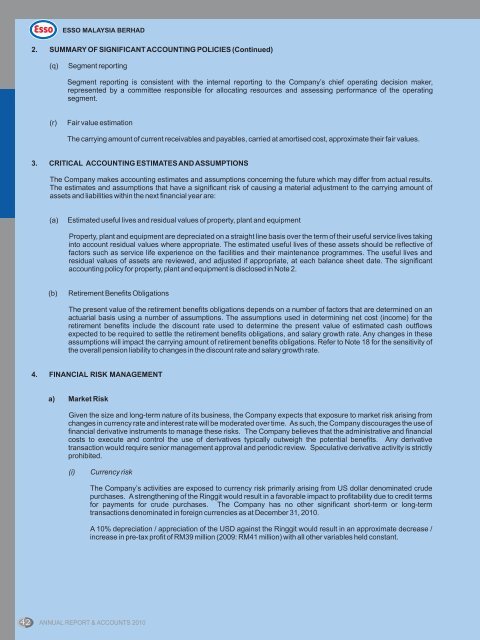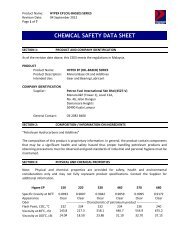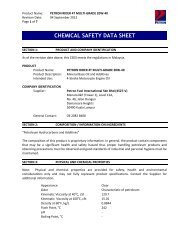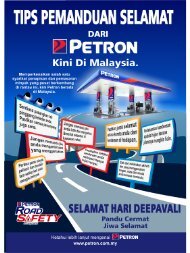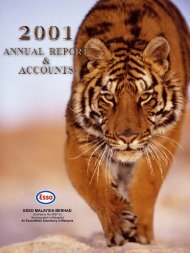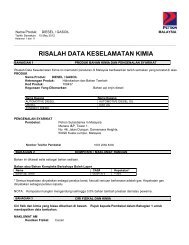2010 Annual Report - Petron
2010 Annual Report - Petron
2010 Annual Report - Petron
You also want an ePaper? Increase the reach of your titles
YUMPU automatically turns print PDFs into web optimized ePapers that Google loves.
ESSO MALAYSIA BERHAD<br />
2. SUMMARY OF SIGNIFICANT ACCOUNTING POLICIES (Continued)<br />
(q)<br />
Segment reporting<br />
Segment reporting is consistent with the internal reporting to the Company’s chief operating decision maker,<br />
represented by a committee responsible for allocating resources and assessing performance of the operating<br />
segment.<br />
(r)<br />
Fair value estimation<br />
The carrying amount of current receivables and payables, carried at amortised cost, approximate their fair values.<br />
3. CRITICAL ACCOUNTING ESTIMATES AND ASSUMPTIONS<br />
The Company makes accounting estimates and assumptions concerning the future which may differ from actual results.<br />
The estimates and assumptions that have a significant risk of causing a material adjustment to the carrying amount of<br />
assets and liabilities within the next financial year are:<br />
(a)<br />
Estimated useful lives and residual values of property, plant and equipment<br />
Property, plant and equipment are depreciated on a straight line basis over the term of their useful service lives taking<br />
into account residual values where appropriate. The estimated useful lives of these assets should be reflective of<br />
factors such as service life experience on the facilities and their maintenance programmes. The useful lives and<br />
residual values of assets are reviewed, and adjusted if appropriate, at each balance sheet date. The significant<br />
accounting policy for property, plant and equipment is disclosed in Note 2.<br />
(b)<br />
Retirement Benefits Obligations<br />
The present value of the retirement benefits obligations depends on a number of factors that are determined on an<br />
actuarial basis using a number of assumptions. The assumptions used in determining net cost (income) for the<br />
retirement benefits include the discount rate used to determine the present value of estimated cash outflows<br />
expected to be required to settle the retirement benefits obligations, and salary growth rate. Any changes in these<br />
assumptions will impact the carrying amount of retirement benefits obligations. Refer to Note 18 for the sensitivity of<br />
the overall pension liability to changes in the discount rate and salary growth rate.<br />
4. FINANCIAL RISK MANAGEMENT<br />
a) Market Risk<br />
Given the size and long-term nature of its business, the Company expects that exposure to market risk arising from<br />
changes in currency rate and interest rate will be moderated over time. As such, the Company discourages the use of<br />
financial derivative instruments to manage these risks. The Company believes that the administrative and financial<br />
costs to execute and control the use of derivatives typically outweigh the potential benefits. Any derivative<br />
transaction would require senior management approval and periodic review. Speculative derivative activity is strictly<br />
prohibited.<br />
(i)<br />
Currency risk<br />
The Company’s activities are exposed to currency risk primarily arising from US dollar denominated crude<br />
purchases. A strengthening of the Ringgit would result in a favorable impact to profitability due to credit terms<br />
for payments for crude purchases. The Company has no other significant short-term or long-term<br />
transactions denominated in foreign currencies as at December 31, <strong>2010</strong>.<br />
A 10% depreciation / appreciation of the USD against the Ringgit would result in an approximate decrease /<br />
increase in pre-tax profit of RM39 million (2009: RM41 million) with all other variables held constant.<br />
42<br />
ANNUAL REPORT & ACCOUNTS <strong>2010</strong>


